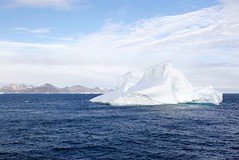A roving compendium of ecocentric energy options, including advances in solar and wind power, hybrid vehicles, and other thoughtful, balanced approaches to renewable energy.
Sunday, May 18, 2008
Generating Jobs, Producing Energy
The tired, old energy paradigms of the last hunded years and the fixation on fossil fuels do nothing for solving climate destabilization problems. In this interview produced by The Real News Network, José Etcheverry, an energy policy analyst for the David Suzuki Foundation, explains how renewable resources, including solar and wind power, encourage a decentralized energy model where individual communities benefit not only from cost-effective power, but jobs and a steady flow of revenues as well.
Monday, May 12, 2008
Rolling Back Carbon Dioxide

The latest message from Bill McKibben is clear: when it comes to climate destabilization, there are no do-overs. McKibben, a latter-day Paul Revere who has been writing about the growing risks of climate change for almost 20 years, is direct and to the point in his latest article, Earth at 350. The number 350 represents the number of parts per million of carbon dioxide in the atmosphere that may help us avoid the tipping points, predicted by NASA climatologist Jim Hansen, that could accumulatively plunge the planet into a death spiral of climatic change. Right now, we're at 385 ppm. Are we smart enough and dedicated enough as a species to reverse current trends and bring CO2 levels down? McKibben thinks so, but it's going to take massive reorganization of our cultural habits and national proclivities to cap the still rising carbon levels.
We're the ones who kicked off the warming; now, the planet is starting to take over the job. Melt all that Arctic ice, for instance, and suddenly the nice white shield that reflected 80 percent of incoming solar radiation back into space has turned to blue water that absorbs 80 percent of the sun's heat. Such feedbacks are beyond history, though not in the sense that Francis Fukuyama had in mind.
And we have, at best, a few years to short-circuit them--to reverse course. Here's the Indian scientist and economist Rajendra Pachauri, who accepted the Nobel Prize on behalf of the Intergovernmental Panel on Climate Change last year (and, by the way, got his job when the Bush Administration, at the behest of Exxon Mobil, forced out his predecessor): "If there's no action before 2012, that's too late. What we do in the next two to three years will determine our future. This is the defining moment."
In the next two or three years, the nations of the world are supposed to be negotiating a successor treaty to the Kyoto Accord. When December 2009 rolls around, heads of state are supposed to converge on Copenhagen to sign a treaty--a treaty that would go into effect at the last plausible moment to heed the most basic and crucial of limits on atmospheric CO2.
If we did everything right, says Hansen, we could see carbon emissions start to fall fairly rapidly and the oceans begin to pull some of that CO2 out of the atmosphere. Before the century was out we might even be on track back to 350. We might stop just short of some of those tipping points, like the Road Runner screeching to a halt at the very edge of the cliff.
McKibben hopes the last-minute Hail Mary pass will be caught.
A few of us have just launched a new campaign, 350.org. Its only goal is to spread this number around the world in the next eighteen months, via art and music and ruckuses of all kinds, in the hope that it will push those post-Kyoto negotiations in the direction of reality.
Depending on who you talk to, optimist or pessimist, we either face salvation or extinction. We can marshall our resources and ingenuity and turn things around, or, alternatively, we can continue whining that humans are too stupid to change and the planet is doomed, and do nothing as temperatures continue to rise. If we're doomed (certainly a distinct possibility), wouldn't you prefer to be on the side of those actively fighting to make the necessary changes to stabilize the climate and just maybe cast the die in favor of survival? Something to consider...
Labels:
climate change,
climate destabilization,
CO2,
global warming,
McKibben
Subscribe to:
Comments (Atom)